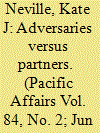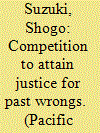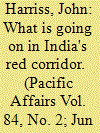|
|
|
Sort Order |
|
|
|
Items / Page
|
|
|
|
|
|
|
| Srl | Item |
| 1 |
ID:
105177


|
|
|
|
|
| Publication |
2011.
|
| Summary/Abstract |
n the Philippines, skepticism about private sector participation in urban water provision became increasingly pronounced as missed service targets and regulatory battles plagued governmental relations with the two companies (Manila Water and Maynilad) granted concessions for water provision in the capital, Manila. A comparative study of these two public-private partnerships (PPPs) reveals the challenges of reconciling bureaucratic and organizational dynamics with public suspicion of the private sector. This study draws on interviews and observations with corporate and government officials, academics, journalists, non-governmental organizations and civil society members in the Philippines, almost a decade after the initial privatization.
This paper furthers our understanding of the outcomes in Manila-and PPPs more generally-by addressing the tension between credible commitment in contractual arrangements and flexibility for responding to economic and environmental shocks. It argues that adversarial interactions between the private corporations and regulators hindered the collaborative negotiations needed to respond to the currency crisis. Fear of public backlash against price increases and contract adjustments prevented the government and companies from engaging in meaningful joint problem solving.
The differential outcomes of the companies illustrate the relevance of specific contractual arrangements and leadership in determining the impact of unforeseen shocks. However, the problems experienced by both companies indicates the need-if the private sector is to equitably and efficiently provide public goods-to redesign PPPs to increase transparency and to develop true partnerships.
|
|
|
|
|
|
|
|
|
|
|
|
|
|
|
|
| 2 |
ID:
105175


|
|
|
|
|
| Publication |
2011.
|
| Summary/Abstract |
This article joins the debate on transnational campaigns for Japanese historical wrongs in the Asia-Pacific by highlighting the collective "forgetting" on the part of the victims' society. Focusing on the Taiwanese "comfort women" issue, I argue that the "comfort women" campaign has been overshadowed by identity politics in Taiwan, and has subsequently lost ground to civil society debates about the KMT's repressive past. In the context of democratization and a growing political movement to emphasize a Taiwanese identity, I argue that a Chinese Other has been constructed to emphasize the island's distinctiveness from China. This, however, has entailed drawing attention to historical wrongs committed by the Nationalist Party (Zhongguo guomindang, or KMT) during Chiang Kai-shek's authoritarian rule, as well as the emergence of a new historical narrative that emphasizes (relatively) benign Japanese colonial rule. This has had the unintended effect of drawing greater societal attention towards party political disputes over Taiwan's national identity and how history should be interpreted, rather than the redress for the former "comfort women."
|
|
|
|
|
|
|
|
|
|
|
|
|
|
|
|
| 3 |
ID:
105179


|
|
|
|
|
| Publication |
2011.
|
| Summary/Abstract |
In September 2009, the Information Office of the State Council of the People's Republic of China claimed that Xinjiang benefits from respect and harmony between the ethnic groups. This rhetoric is faithfully propagated by national media: they uniformly praise the unity amongst the Han and Uyghurs through the common slogans of minzu tuanjie (ethnic unity ) and hexie guanxi (harmonious relations). Going beyond the official documents and propaganda, my purpose is to explore the relations between these two ethnic groups. I will focus on the ideas, words and actions of Han and Uyghur young people living in Urumqi who are often under-represented in official sources, or other forms of written and scholarly discourse. While comparing their behaviour, I argue that ethnic disharmony between Hans and Uyghurs exists, but it is simplistic to blame only the Chinese government or one of the ethnic groups, and naïve to ask what China can do to solve the problem. Instead, by exploring what the social agents in the young educated society in Xinjiang truly think of ethnic relations between them and the "other," this paper presents a comprehensive picture of the issue. My ethnographic research interprets how people remember, interpret and sometimes exaggerate their ethnic traditions and cultural practices in daily life in relation to the other ethnic group. The findings demonstrate how young people are determining the course of ethnic relations by constructing movable social barriers that result in segregation between them, raising doubts about the future possibilities for ethnic harmony.
|
|
|
|
|
|
|
|
|
|
|
|
|
|
|
|
| 4 |
ID:
105181


|
|
|
|
|
| Publication |
2011.
|
| Summary/Abstract |
Cambodia has undergone substantial changes since the United Nations' sponsored election in 1993. Politically, the country has become increasingly stable under the domination of the ruling Cambodian People's Party (CPP). Economically, Cambodia has achieved an unprecedented level of economic performance, with GDP growth averaging almost 10 percent annually during the five years preceding the current economic crisis. In spite of these improvements in political and economic conditions, land rights have emerged as a major issue affecting the lives of many poor Cambodians. Comprehensive overall analysis of land policy reforms in the country remains lacking, however, and this article fills a void in the existing literature. Our analysis shows that despite land policy reforms in the past decade, Cambodia's land rights problems continue unabated. What accounts for this development? Through analysis of government land policies, an array of primary documents, and interview data from government officials and investors, this article questions the relevance of Cambodia's land policy reforms. Its central premise is that although past collectivization and weak governmental institutions have contributed to land rights issues, it is neopatrimonialism-a mechanism that dictates political interaction among the elites and between the elites and the electorate and resources governance and distribution-that perpetuates land rights problems and limits land policy reform.
|
|
|
|
|
|
|
|
|
|
|
|
|
|
|
|
| 5 |
ID:
105183


|
|
|
|
|
| Publication |
2011.
|
| Summary/Abstract |
Drawing on the small number of recent ethnographic studies, on reports by human rights activists, and on some reports by journalists, this paper explores reasons for the strength of the Maoist insurgency across the "red corridor": a large tract of India, from the border with Nepal through to the south. It finds that while the "feasibility thesis," as developed by Fearon and Laitin in particular, amongst recent general theorists of the determinants of civil war and insurgency, has explanatory power, there is also evidence of the significance of "grievance," especially amongst the tribal people of central India. The Maoists have certainly not always been the drivers of resistance to the many cases of realized or attempted dispossession across the region, but they seem to be sympathetic to movements of resistance, and often to articulate grievances against the state, both for what it has done (encouraging expropriation for mining, infrastructural and industrial projects) and for what it has not done (in the supply of basic services). The alternative "greed" hypothesis is found to be less strongly supported, though rents from the rich mineral and forest resources of central India do play a part in the story. The Maoists support people's aspirations but their supportive moves can be in contradiction with their broader strategic ambitions-of taking over state power-and the spiral of violence that often follows can end up betraying those whom they claim to support.
|
|
|
|
|
|
|
|
|
|
|
|
|
|
|
|
|
|
|
|
|